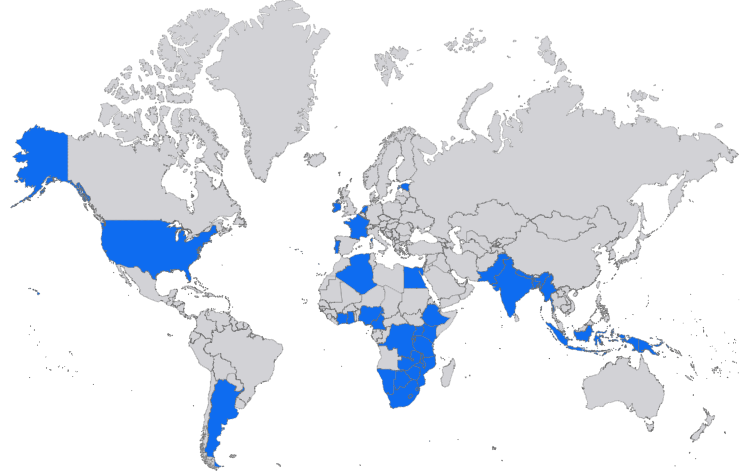In June 2013, the World Health Organization released new guidelines for treating and preventing HIV in middle-and low-income countries. Option B+, the new recommendation for the prevention of mother-to-child transmission of HIV (PMTCT), calls for all pregnant and breastfeeding HIV Positive women to initiate lifelong HIV treatment.
In an effort to help train as many health workers in Option B+ as possible, ICAP—lead by Director and University Professor Wafaa El-Sadr—collaborated with CCNMTL to create an e-learning course on Option B+ targeting nursing faculty and students in sub-Saharan Africa. Option B+ is the flagship course inside the new ICAP Nursing E-learning platform. Free and open to the public, it was developed with support from the U.S. President’s Emergency Plan for AIDS Relief (PEPFAR).
Since ICAP’s announcement of the new course in October, interest in the Option B+ course has mushroomed. As of the start of the year, we’ve seen users of the course in 43 countries, both inside and outside sub-Saharan Africa. Users from around the world have been sending in requests to join the program, as well as notes of thanks for providing the material.

Why is the demand for this course so great? Many countries have implemented in-service (i.e. post-graduate) workshop trainings to teach existing professionals the new standards. However, these programs are expensive and can be plagued with low attendance because the demand for nurses and midwives is so great that health workers must remain in clinics providing care. Additionally, in-service trainings do not include faculty or students at nursing schools, the very people who will be forming the front line of health professionals in the coming years. For example, Malawi has been providing national in-service trainings including Option B+ since 2010, yet faculty at nursing schools including Mzuzu and Malawi College of Health Sciences said that they had not had the opportunity to be trained on Option B+. They downloaded the national guidelines, but hadn’t yet incorporated them into the undergraduate curriculum.
“E-learning has the potential to enhance undergraduate nursing education and to make continuing education more convenient by reducing absenteeism associated with in-service training workshops, so that nurses can remain at the front lines providing care,” says Janel Smith, nursing education officer at ICAP. The faculty and student focus of the course also addresses the current gap between nursing education and in-service trainings.
ICAP is currently piloting the new e-learning course at ten nursing schools in Malawi, Lesotho, and Zambia and will be evaluating faculty and student response to the course in February. ICAP has also promoted the course for continuing education among practicing nurses and midwives in sub-Saharan Africa through the East, Central, and Southern Africa Colleges of Nursing (ECSACON) Continuing Professional Development Library which provides a certificate for download. In addition, ICAP and CCNMTL expect to see continued uptake of the course in many countries outside Africa.
Related news:
Nov-12-2014: ICAP and CCNMTL Launch Nursing E-Learning Platform

 NEWS FEED
NEWS FEED